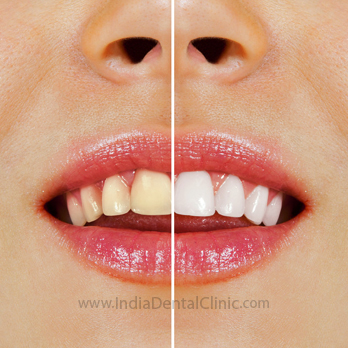Abscessed Teeth & Gums
More On Endodontics
About EndodonticsApicoectomy
Endodontic Surgery
Hemisection
Internal Bleaching
Post & Core
Pulpotomy Pulpectomy
Root Canal
Tooth Enamel Erosion
A pocket of infected liquid (pus) that collects in a small area within the body is known as an abscess that your dentist at India Dental Clinic would also explain when visiting for consultation. Tooth abscess, known also as Periapical abscess, Dental abscess, Tooth infection, is a painful infection at the root of a tooth or between the gum and a tooth. It’s most commonly caused by severe tooth decay. Other causes of tooth abscess are trauma to the tooth, such as when it is broken or chipped, and gingivitis or gum disease. Abscesses can occur anywhere in the body, including the mouth affecting general dental health. In the mouth, abscesses can occur at the end (tip) of a tooth’s root or in the space between the teeth and gums. An abscess may develop at any age after the teeth have erupted. Infection may spread into the tissue and bones surrounding the tooth. If left untreated, it may also spread throughout the body, affecting the heart or lungs.
When bacteria is suspected to have entered certain areas (e.g., pulp of the tooth, deep gum pockets) of the mouth dental abscesses occur. Typically, decay or cracks in a tooth’s enamel allow bacteria access to the inner tooth (pulp). Gum disease can create deep spaces between the teeth where bacteria may thrive and develop into an abscess. A dentist can usually diagnose an abscess based on examination of the patient’s mouth, which may include gently tapping a patient’s teeth (to identify the extent of damage to the pulp) and x-rays (to determine if bone loss has occurred). In addition, patients are usually asked to provide details about their symptoms when making dental visit to India Dental Clinic.
A significant pain can be expected when dental abscesses are present. This pain may be sharp or throbbing and is usually persistent. Additional symptoms of a dental abscess can include fever, sensitivity to hot and cold, a visible boil in the gums near a tooth (which may rupture and leak fluid), or red, swollen gums. Patients who experience dental pain, or who have visible signs of an abscess, should consult their dentist immediately for right dental care at dental center in India. Even if the pain goes away, any infected tissue needs to be removed and the cause of the abscess treated.
Once the cause of infection is identified, treating an abscess includes draining the abscess. These are often done at the same time, such as in the case of a root canal procedure. This allows the pus to drain from the tooth root while removing diseased tissue that led to the abscess. When the tooth damage is severe, tooth extraction may be required. Follow-up care may include antibiotics to eliminate the spread of infection, saltwater rinse to soothe inflamed tissue and follow-up x-rays to ensure proper bone and tissue regrowth in the area.
One of the best ways to consciously do is preventing its causes – primarily tooth decay. This can be done practicing daily brushing and flossing. Firmly remaining committed to regular dental visits can also help prevent dental problems that normally lead to infection and abscess. Due to lack of regular preventative dental care, the infection spreads into the ligaments that secure the tooth to the jawbone, and the bone loss surrounding teeth may occur. This causes teeth to become loose and may lead to tooth loss.
Food in the deep pockets of space between the teeth and gums harbour bacteria where an abscess can form. These pockets usually appear in people with periodontal disease (when the gums pull away from the teeth). When food or other debris remains embedded deep in the gums, bacteria can grow, and an abscess may form. In addition, an untreated abscess may cause scar tissue to develop, which can result in a fistula (tunnel in tissue).
Diagnosis methods for abscessed teeth & gums
A dentist can look for visible signs of abscess in the oral region to make a dental treatment plan at India Dental Clinic. The signs may be in the form of boil in the gums near a tooth or some times redness and swelling of gum tissue. The dentist may also ask questions concerning a patient’s symptoms, such as when the pain started, where it is located, and if pain is felt when biting or closing the mouth to ensure it is not heading TMJ Disorders.
The examination may also include:
Pulp test: A dentist may start the process with gently tapping a tooth, apply cold or heat, or use electrical stimulation. If pain is not felt during these tests, the nerves in the pulp may no longer be alive. This may confirm the extent of damage to the pulp of the tooth. The tactical evidence of an abscess present beneath the gum tissue may confirm by pushing on the swollen area of the gum.
Dental x-rays: These may be resorted to for identifying any erosion of bone that may occur in the bone surrounding an abscessed tooth.
Bacteria may gain access to these areas for several reasons, including:
Untreated decay that form deep cavities lead to the inner tooth and affecting the pulp are among the most common causes of a tooth abscess.
Cracked tooth: When fractures or cracks in the enamel and dentin are present, these can allow bacteria into the pulp, which may lead to infection and abscess. This is a common cause of tooth abscesses.
Periodontal (gum) disease: The presence of gum disease causes the gums to pull away from the teeth, creating deep pockets of space between the teeth and gums. If food particles become stuck in these pockets, bacteria may grow and an abscess can develop in the gums.
Unrepaired restorations: There are chances of weakened dental restorations (e.g., fillings) that may break down over time and allow bacteria access to the pulp, potentially causing an infection and abscess.
Some of the other signs of an abscess in the mouth include:
1. Red, swollen gums
2. Fever
3. Swelling of the jaw or face
4. Swollen lymph nodes in the neck
5. Sinus pressure
6. Boil may rupture and leak fluid in the gums
7. Halitosis (bad breath)
Dental Treatment in India options for abscessed teeth & gums:
You can have the dental care in India visiting one of the tooth care centers of India Dental Clinic. In order to treat a dental abscess it involves a multistep process. It needs addressing the abscess itself, and then treating the cause and preventing any further damage or injury (including tooth loss) if possible. A dentist or Endodontist will usually perform this work. More than one office visit may be necessary in treating an abscess. You may plan your dental India tour accordingly.
Steps taken to treat an abscess may include:
The abscessed material (pus) trapped inside the tooth or under the skin must be released (drained). As soon as abscess is drained, signs of pain should immediately disappear. There are a numbers of ways that abscesses can be drained. If the abscess is in the gums, it usually involves incision and drainage through gum tissue. If the abscess is in the tooth root, it can be drained by an opening made through the tooth. This may be done as part of a root canal treatment or tooth extractions.
Treating the source of the infection at India Dental Clinic may include:
Root canal: This involves removing diseased tissue from the pulp of the tooth and allows the patient to save the original tooth. The area is filled in with a material similar to rubber (gutta percha) and topped with a dental filling or dental crown. If infected pulp is not removed, pain and swelling may continue and the infection may spread.
Tooth extraction: If an abscess is severe, a tooth or the jaw is badly damaged and a root canal procedure will not likely save the tooth, a tooth extraction may be necessary. Before the development of many modern dental procedures, extraction was the only way to treat an abscessed tooth. A considerable wait would be required for healing before a dental bridge or a partial denture or dental implants can be considered for the site.
How best to prevent complications: This includes preventing infection that may spread to other areas of the body, as well as reducing pain and swelling.
Medication: This may include antibiotics to ensure the infection has been eliminated and to prevent its spread. Prescription or over-the-counter pain relievers may be recommended to relieve pain and swelling related to the abscess or its treatment. Patients should never place aspirin directly on the gums because it may burn skin tissue, causing mouth sores.
Saltwater rinse: Patients may be advised to rinse their mouths with a saltwater solution (1/8 teaspoon salt and 8 ounces of warm water). This can help cleanse the mouth, encourage drainage and may temporarily lessen pain and pressure in the area. This may be done several times a day for a few days after treatment of a dental abscess.
Ice pack outside the cheek: This may help reduce facial inflammation.
Follow-up x-rays. These may be taken six months after treatment of an abscess. They are used to confirm that bone and tissue have appropriately regenerated in the treated area. If not, a patient may be referred to a periodontist (to surgically reshape gums for easier cleaning) or endodontist (to surgically remove a persistent abscess) for additional treatment.
Prevention of abscessed teeth & gums:
The increase in dental hygiene practices method can prevent tooth decay that happens to be a common cause of dental abscesses. The primary method may include:
Brushing of teeth removes plaque that can cause tooth decay. Teeth should be brushed upon awakening, before sleep and after every meal. As far as possible, teeth should be flossed every day. Daily flossing ensures removal of plaque and food particles that become lodged between teeth.
Teeth are easy to treat by regular dental examinations and cleanings, and help to identify problems early. It removes the buildup of tartar before they can become abscesses. Food particles and bacteria can be gotten rid of by chewing on sugarless gum, particularly when one is away from home and not in a position to brush teeth. Opting for a well balanced, healthy diet that specifically does not include tooth decay causing sugary foods and beverages can help avoid tooth decay. This also helps immune system and avoids infections.
Prevent or treat dry mouth. The presence of saliva helps keep the oral area clear of food particles and bacteria. When there is a lack of saliva in the mouth, this dry condition can increase the risk of tooth decay. Drink lots and lots of fresh/mineral water to help promote saliva production. Medication may be needed to treat severe cases of dry mouth.
The tobacco is best avoided. Smokers or tobacco chewers stand at increased risk of gum disease and potentially lead to infections, dental abscesses, and even oral cancer. The patients with weaker heart conditions (or immune systems deficiencies) may receive antibiotics prior to any dental treatment at India Dental Clinic. This helps prevent the risk of infection.
More dental deals in Other Cities

Free Dental Checkup And Teeth Lightning at Best de
Special Price - 400 (INR-Indian Rupee )Treatments Covered-
- Teeth Cleaning
- Fluoride Application
- Expert Consultation
- Cosmetic Dentistry Consultation
View Details Hyderabad

No Pain But Lots Of Gain
Special Price - 1500 (INR-Indian Rupee )Treatments Covered-
- Root Canal (anterior tooth)
- PFM Dental Crown (non precious metal)
View Details Jamshedpur

special Dental Discount
Treatments Covered-- All Ceramic Dental Crowns
- Laser Teeth Whitening
- Metal Free Crown
- Porcelain Veneer
View Details Mumbai


